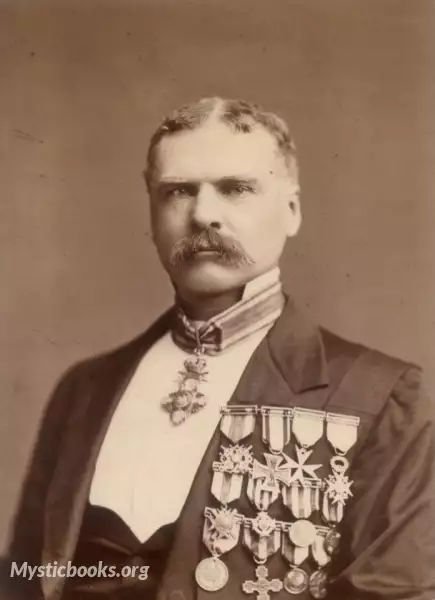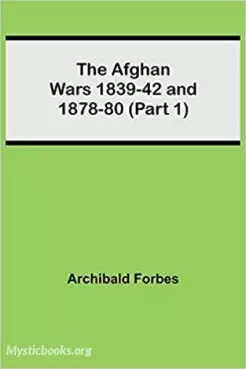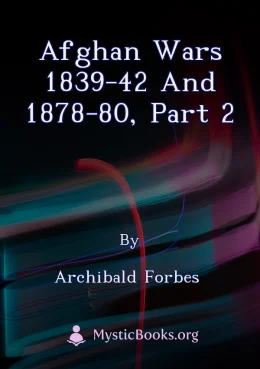
Timeline
Title
Country/Nationality
Archibald Forbes
Archibald Forbes was a Scottish war correspondent.
He was the son of Very Rev Lewis William Forbes DD (1794–1854), minister of Boharm, Banffshire, and Moderator of the General Assembly of the Church of Scotland in 1852, and his second wife, Elizabeth Leslie, daughter of Archibald Young Leslie of Kininvie. He was born in Morayshire in 1838.
After studying at the University of Aberdeen from 1854 to 1857, he went to Edinburgh, and after hearing a course of lectures by (Sir) William Howard Russell, the famous correspondent, he enlisted in the Royal Dragoons. While still a trooper he began writing for the Morning Star, and succeeded in getting several papers on military subjects accepted by the Cornhill Magazine.
On being invalided from the army in 1867, he started and ran with very little external aid a weekly journal called the London Scotsman (1867–1871). His chance as a war correspondent came when he was employed by the Daily News to cover the Franco Prussian war. Joining the Prussian army near Cologne, he accompanied them on their march into France, witnessing battles at Spicheren, Gravelotte and Sedan before joining the forces besieging Metz. In all the previous reports from battlefields comparatively sparing use had been made of the telegraph.
Forbes laments his own supineness in the matter of wiring full details from the scene of operations. But the intensity of competition rapidly developed the long war telegram during the autumn of 1870, and no one contributed more effectively to this result than Forbes. He witnessed many of the events of the autumn campaign and entered Paris with the Prussians (with whom he established excellent relations) on 1 March 1871. On this occasion he was nearly drowned in a Parisian fountain as a German spy by an enthusiastic French mob. He managed to arrive first in England with his account of the Prussian entry. Two months later he returned to Paris and witnessed the horrors of the commune with the sang froid for which he became celebrated.
In 1873, he represented the Daily News at the Vienna exhibition; subsequently he saw fighting in Spain, both with the Carlists and their opponents ; and in 1875 he accompanied the Prince of Wales on his visit to India. In 1876, he was with Michael Gregorovitch Tchernaieff and the Russian volunteers in the Serbian campaign of 1876. In 1877, he witnessed the Russian invasion of Turkey, and on 23 August was presented to Alexander II at Gornic Studen as the bearer of important news from the Schipka Pass. On this occasion, the emperor conferred upon him the order of St. Stanislaus for his services to the Russian soldiers before Plevna. During 1878, after a brief visit to Cyprus to witness the British occupation, he lectured in England upon the Russo-Turkish war. In 1878–79 he went out to Afghanistan, and accompanied the Khyber Pass force to Jalalabad. He was present at the capture of Ali Musjid, and marched with several expeditions against the hill tribes.
From Afghanistan, he went to Mandalay and had interviews with Thibaw Min. In 1880, he was with Lord Chelmsford as a British force was preparing for the Zulu War. On 5 July, after the victory of Ulundi, he rode 110 miles to Landman's Drift in twenty hours. Two days after his arrival there he appeared in a state of utter exhaustion before Pietermaritzburg, having ridden by way of Ladysmith and Estcourt, an additional 170 miles, in thirty-five hours.
The news of Ulundi first reached England through his agency, he having completely outpaced the official despatch rider. He put in a claim for the Avar medal on the strength of this piece of service, but the request was refused with scant courtesy by the war office.
Some of his criticisms of Lord Chelmsford were held in certain quarters to have been unnecessarily offensive. Forbes had seen war practically illustrated in all quarters of the globe, and he had outgrown any semblance of diffidence in passing judgment upon difficult military operations.
Books by Archibald Forbes

The Afghan Wars 1839-42 and 1878-80, Part 1
The First Anglo–Afghan War was fought between British India and Afghanistan from 1839 to 1842. It was one of the first major conflicts during the Great Game, the 19th century competition for power and influence in Central Asia between the United King...

Afghan Wars 1839-42 and 1878-80, Part 2
This book discusses the 1878-80 Afghan War, which was a major conflict in the Great Game, the 19th century competition for power and influence in Central Asia between the United Kingdom and Russia. The war was one of the worst setbacks inflicted on B...